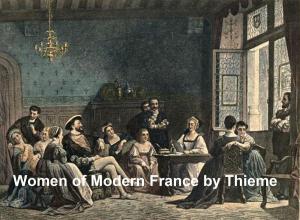La Mechante Femme Mise a la Raison (The Taming of the Shrew in French)
Nonfiction, Entertainment, Drama, Shakespeare, Fiction & Literature| Author: | William Shakespeare | ISBN: | 9781455426515 |
| Publisher: | Seltzer Books | Publication: | February 23, 2017 |
| Imprint: | Language: | French |
| Author: | William Shakespeare |
| ISBN: | 9781455426515 |
| Publisher: | Seltzer Books |
| Publication: | February 23, 2017 |
| Imprint: | |
| Language: | French |
Shakespeare comedy, translated to French by Francois Pierre Guillaume Guizot (1787 - 1874), French historian, and statesman. Published in 1862. According to Wikipedia: "The Taming of the Shrew is a comedy by William Shakespeare, believed to have been written between 1590 and 1591. The play begins with a framing device, often referred to as the Induction, in which a mischievous nobleman tricks a drunken tinker named Sly into believing he is actually a nobleman himself. The nobleman then has the play performed for Sly's diversion. The main plot depicts the courtship of Petruchio, a gentleman of Verona, and Katherina, the headstrong, obdurate shrew. Initially, Katherina is an unwilling participant in the relationship, but Petruchio tempers her with various psychological torments—the "taming"—until she becomes a compliant and obedient bride. The subplot features a competition between the suitors of Katherina's more desirable sister, Bianca."
Shakespeare comedy, translated to French by Francois Pierre Guillaume Guizot (1787 - 1874), French historian, and statesman. Published in 1862. According to Wikipedia: "The Taming of the Shrew is a comedy by William Shakespeare, believed to have been written between 1590 and 1591. The play begins with a framing device, often referred to as the Induction, in which a mischievous nobleman tricks a drunken tinker named Sly into believing he is actually a nobleman himself. The nobleman then has the play performed for Sly's diversion. The main plot depicts the courtship of Petruchio, a gentleman of Verona, and Katherina, the headstrong, obdurate shrew. Initially, Katherina is an unwilling participant in the relationship, but Petruchio tempers her with various psychological torments—the "taming"—until she becomes a compliant and obedient bride. The subplot features a competition between the suitors of Katherina's more desirable sister, Bianca."















